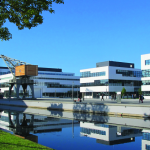Sustainable Development Management | Rhine-Waal UoAS
The master's program in Sustainable Development Management integrates and connects the parts of economics and political science relevant to sustainable development. These are supplemented by empirical methods and modules of project management.
How does the programme provide content to ensure students achieve an understanding of a reasonably diverse set of perspectives on understanding economies?
The contemporary problems of lower income countries and the past experience of high income countries are analysed on the background of sound economic theory as a framework for the evaluation of current development policies and the proposal of future development policies. The microeconomic foundations such as human capital, transaction costs, asymmetric information, and the role of institutions are looked at and linked to the macroeconomic aspects of economic growth, infrastructure, labour markets, and migration models. However, as the program is interdisciplinary, in nature and even aims at transdiscipöinarity, it also puts the notion of politics and political frameworks and processes as shapers of development center stage. Students are trained to take into account the mutual impact of politics and economics.
How does the programme ensure students understand the interaction between economic and ecological systems?
Livelihood of most people in developing and emerging countries is directly linked to the use of natural resources. Students therefore get an overview over global exploitation of natural resources and problems arising from overuse and degradation of environment like global warming, biodiversity loss, deforestation and desertitification which may irreversibly destroy the economic basis of poor people. Students know the contemporary challenges of sustainable resource use and can propose sustainable policy choices and development interventions to safeguard environment and secure livelihood of poor people.
How does the programme ensure students understand how to critically explore real-world evidence, both qualitative and quantitative?
Our students do not only learn how to write successful proposals, but also how to make use of qualitative and quantitative methods to conduct field research missions for appraisals and evaluations. Surveys, interviews and participatory methods are valuable instruments to design context-sensitive projects that cater to all of stakeholders’ needs. We believe that more research is needed to appraise, review and evaluate projects in order to draw valuable lessons that can enhance the quality and sustainability of projects. A special emphasis on the programme lies therefore on statistical methods, providing students with the necessary skills to conduct sound evaluations and impact assessments. Another core concern ist o train students in critically reflecting upon administrative and management practices in the context of development.
What pedagogical approaches does the programme use to ensure that students examine the historical context, assumptions and values in all economic thinking?
As our students and staff come from developed and developing countries alike, we offer an intercultural study environment conducive to the development of various soft-skills. As a university of applied sciences, we also strive to enrich the academic discussion around sustainable development and on the other hand, to derive specific policy advice by studying the practical facets of the implementation of processes that lead to social transformation. Part of that mission ist o bring students in close contact with development institutions, NGOs in the fiel das well as companies in their development-related undertakings.
How does the department ensure that the teaching culture and capacity to deliver economic pluralism are continually improving?
The course is continually assessed and evaluated by our students and regularly by a re-accreditation commission. The department is aiming to keep a high standard of inter-disciplinary teaching culture via its wide range of perspectives on economic issues in the elective courses as well as guest lecturing.
Other information:
Our study programme is part of the EPOS programme (Development-Related Postgraduate Courses) financed by the German Academic Exchange Service (DAAD). A limited number of full scholarships are awarded to excellent students from developing countries each year. Students may also take part in the elective module exchange initiated by the German Association of Postgraduate Programmes with special Relevance to Developing Countries (AGEP) – www.agep-info.de
Country:
Germany
University:
Rhine-Waal UoAS
Course name:
Sustainable Development Management
Department/school:
Facultz of Society and Economics
Course level:
Taught Masters
Course language:
English

 all programmes
all programmes